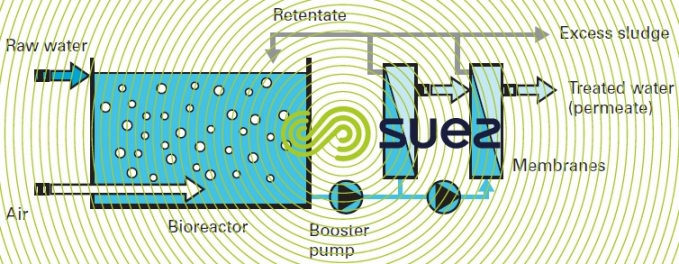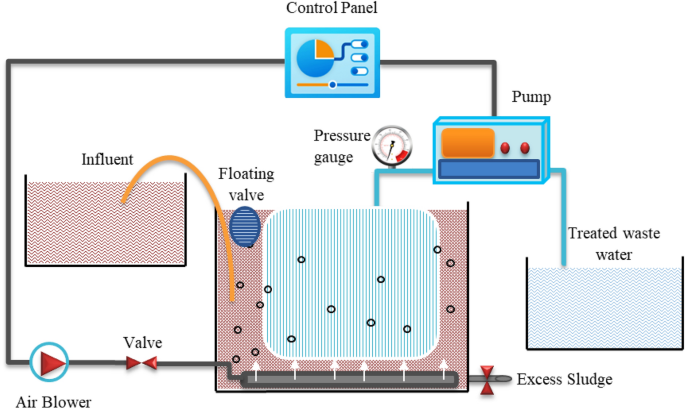Troubleshooting Common Issues with Membrane Bioreactor Systems
Troubleshooting Common Issues with Membrane Bioreactor Systems
Blog Article
How Membrane Bioreactors Are Revolutionizing Water Purification Solutions
The appearance of membrane layer bioreactors (MBRs) stands for a substantial advancement in the area of water filtration, combining biological therapy procedures with sophisticated membrane layer purification innovations. As international water deficiency escalates, the duty of MBRs in promoting safe and clean water reuse and lasting water monitoring comes to be significantly essential.
Review of Membrane Layer Bioreactors
Membrane bioreactors (MBRs) represent a considerable innovation in water filtration innovation, as they combine biological therapy processes with membrane filtering. This combination improves the performance of wastewater therapy by using microorganisms to degrade natural toxins while at the same time using semi-permeable membranes to separate cured water from suspended solids and pathogens.
The MBR system generally contains an organic reactor where the microbial populace metabolizes contaminants, adhered to by a membrane layer filtering unit that preserves biomass and enables just clean water to pass through. This twin performance results in greater effluent quality compared to conventional therapy methods. MBRs can be run in both batch and constant circulation modes, supplying versatility in design and application.
They likewise make it possible for the recovery of water for reuse, thus contributing to water sustainability efforts. Generally, MBRs are at the center of improving water treatment effectiveness and quality, showcasing the possibility for innovative solutions in ecological management.
Advantages of MBR Technology
The combination of biological treatment with membrane filtering uses countless benefits for water filtration procedures. Among the main benefits of Membrane layer Bioreactor (MBR) modern technology is its capacity to efficiently eliminate both organic and inorganic contaminants, leading to top quality effluent. The membranes serve as a physical barrier, avoiding suspended solids and pathogens from passing through, which boosts the general safety and security and dependability of treated water.
Additionally, MBR systems require a smaller sized impact compared to traditional treatment approaches, enabling a lot more effective space use. This portable style is particularly advantageous in city settings where land is limited. MBRs additionally show operational adaptability, fitting varying influent qualities and flow rates without substantial efficiency degradation.
In addition, the procedure offers improved nutrient removal capacities, especially for nitrogen and phosphorus, which are vital for preventing eutrophication in obtaining waters. The minimized sludge production related to MBR modern technology also converts to reduce disposal prices, making it a cost-effective remedy in the long run - Membrane Bioreactor. Overall, the advantages of MBR modern technology setting it as a leading choice for lasting and innovative water filtration systems, addressing both environmental and financial issues
Applications in Water Filtration
Applications of Membrane Bioreactor (MBR) innovation in water filtration are impactful and diverse, attending to various therapy requires throughout multiple markets. MBRs properly integrate organic therapy processes with membrane purification, making them perfect for local wastewater therapy, industrial effluent administration, and also safe and clean water reuse initiatives.
In municipal settings, MBRs are increasingly employed to enhance the high quality of treated wastewater, enabling for conformity with rigid discharge laws and promoting the recycling of water for watering and non-potable usages. Their portable style additionally makes them ideal for city settings where area is restricted.
Industrially, MBR innovation is utilized to treat process water and wastewater, particularly in sectors such as food and drink, drugs, and fabrics. By successfully removing contaminants and suspended solids, MBRs aid sectors lessen ecological effects while recouping valuable sources from wastewater streams.
Additionally, MBRs are getting traction in decentralized water treatment applications, where small systems can be deployed in remote areas or creating areas. This versatility enables areas to accomplish lasting water monitoring options, improving access to tidy water while decreasing dependence on traditional treatment methods.
Instance Research Studies and Success Stories

In another instance, a textile production center in Bangladesh embraced MBR technology to click over here now resolve its wastewater difficulties. The system reduced chemical oxygen need (COD) levels from 1,200 mg/L to much less than 100 mg/L, therefore meeting governing requirements and significantly decreasing environmental influence.
The University of Cape Community's MBR setup has actually shown reliable in treating greywater for non-potable reuse on school. This project not only preserves drinkable water yet also offers as an educational design for lasting practices.
Furthermore, a seafood processing plant in Norway made use of MBR modern technology to deal with effluents having high levels of natural issue, recommended you read achieving over 90% contaminant elimination. These case research studies emphasize MBR innovation's adaptability and its vital function in improving water top quality across diverse applications.
Future of Water Therapy Solutions
As international water scarcity and contamination difficulties intensify, innovative water treatment options are coming to be increasingly necessary to make certain lasting access to clean water. The future of water treatment depends on the combination of sophisticated modern technologies that boost the efficiency and effectiveness of purification processes. Membrane bioreactors (MBRs) are at the forefront of this evolution, combining biological treatment with membrane filtration to produce top quality effluent appropriate for different applications.

Emerging fads such as source recuperation from wastewater, consisting of nutrients and energy, will certainly better change therapy facilities right into green centers. Advancements in nanotechnology and membrane layer materials guarantee enhanced performance and durability of filtration systems.

Conclusion
To conclude, membrane bioreactors represent a substantial advancement in water filtration innovations, effectively incorporating biological therapy with advanced membrane layer filtration. The many site link benefits, consisting of boosted effluent quality and lowered spatial demands, make MBRs specifically appropriate for city applications. Their role in safe and clean water reuse and lasting water management highlights their relevance in dealing with international water scarcity difficulties. Proceeded research and advancement will certainly even more improve the efficacy and adoption of MBR modern technology, guaranteeing a durable future for water therapy solutions.
The development of membrane layer bioreactors (MBRs) stands for a substantial improvement in the area of water filtration, combining organic therapy processes with cutting-edge membrane filtration innovations. As global water scarcity increases, the duty of MBRs in promoting safe and clean water reuse and lasting water monitoring comes to be significantly essential. They additionally make it possible for the healing of water for reuse, therefore adding to water sustainability campaigns.As worldwide water shortage and contamination difficulties intensify, innovative water therapy remedies are coming to be significantly necessary to make sure sustainable access to tidy water. Their duty in safe and clean water reuse and lasting water administration highlights their importance in addressing international water deficiency difficulties.
Report this page